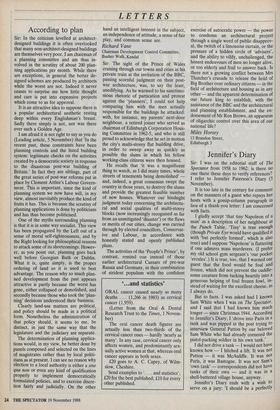LETTERS
According to plan
Sir: In the criticism levelled at architect- designed buildings it is often overlooked that many non-architect-designed buildings are themselves very poor. I am chairman of a planning committee and am thus in- volved in the scrutiny of about 200 plan- ning applications per month. While there are exceptions, in general the better de- signed schemes are produced by architects while the worst are not. Indeed it never ceases to surprise me how little thought and care is put into expensive projects which come to us for approval.
It is an attractive idea to suppose there is a popular architectural aesthetic resting deep within every Englishman's breast. Sadly there simply is not, nor was there ever such a Golden Age.
I am afraid it is not right to say as you do (Leading article, 5 November) that 'In the recent past, these constraints have been planning controls and the listed building system: legitimate checks on the activities created by a democratic society in response to the disastrous post-war building of Britain.' In fact they are siblings, part of the great series of post-war reforms put in place by Clement Attlee's Labour Govern- ment. This is important, since the kind of planning system we now have will, in my view, almost inevitably produce the kind of fruits it has. This is because the scrutiny of planning applications is done by politicians and has thus become politicised.
One of the myths surrounding planning is that it is in some way socialist. This view has been propagated by the Left out of a sense of moral self-righteousness, and by the Right looking for philosophical reasons to attack some of its shortcomings. Howev- er, as you point out, planning goes back well before Georgian Bath or Dublin. What it is, quite simply, is the proper ordering of land so it is used to best advantage. The reason why so much plan- ned development from the past appears attractive is partly because the worst has gone, either collapsed or demolished, and secondly because those who took the 'plan- ning' decisions understood their business.
Clearly land-use matters are political, and policy should be made in a political form. Nonetheless the administration of that policy should, it seems to me, be distinct, in just the same way that the legislature and the judiciary are separate.
The determination of planning applica- tions would, in my view, be better done by panels composed and selected on the lines of magistrates rather than by local politi- cians as at present. I can see no reason why election to a local authority is either a sine qua non or even any kind of qualification properly to implement democratically formulated policies, and to exercise discre- tion fairly and judicially. On the other hand an intelligent interest in the subject, an independence of attitude, a sense of fair play, and common sense are.
Richard Vane
Chairman Development Control Committee, Busher Walk, Kendal






















































 Previous page
Previous page